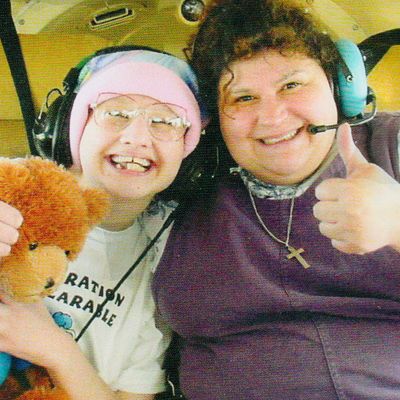
The story of Gypsy Rose Blanchard is simply too juicy for a documentarian to resist. In June 2015, then-23-year-old Gypsy was convicted of second-degree murder in the stabbing death of her mother, Dee Dee. (Her boyfriend and accused knife wielder, Nicholas Godejohn, still awaits trial on first-degree murder charges.) But it turns out that Gypsy had been a victim of Dee Dee’s Munchausen syndrome by proxy her entire life, meaning she was told by her mother her entire life that she was ill and confined to a wheelchair despite being able-bodied. Gypsy endured more than two decades of meritless hospitalizations and treatments for myriad phantom illnesses.
Erin Lee Carr’s Mommy Dead and Dearest, down to its title, doesn’t dance around the case’s lurid appeal, and the circumstances surrounding Dee Dee and Gypsy’s relationship are extreme. But the film does open up a dialogue about Munchausen (when the victim manifests illness in themselves) and Munchausen by proxy, or as the latter has been referred to more pointedly of late, medical child abuse. Dr. Marc Feldman, a leading expert on the condition and prominent on-camera presence in Mommy Dead and Dearest, spoke with us about the film’s handling of this misunderstood affliction, and what life might look like for Gypsy — who’s serving a ten-year sentence — upon potential release at the age of 32.
I know you’ve just seen the finished film. How successfully do you think it balanced true crime with the more clinical conversation?
I thought it was really well done, despite my being in it. It’s an inherently sensational case, to say the least. My first thought was the production was very sensational, too, but I don’t know if that’s true. Just presenting the facts of the case, your jaw drops.
My most lingering question was why doctors didn’t intervene in Dee Dee’s care of Gypsy sooner, and more seriously.
That’s my thought exactly, and it comes up in most of the Munchausen by proxy cases I deal with. I was troubled by the pediatric neurologist who was interviewed. He was presented almost as a hero of the story, and I really thought he had a gross misunderstanding of his obligations as a physician, as well as the legal requirements to report suspected abuse or neglect. He seemed to think that only if there is neglect are you compelled as a physician to make a report. That’s not true at all. By virtue of including Munchausen by proxy among the possible diagnoses, he had a responsibility to make a report to Child Protective Services. This conundrum arises in case after case, where innumerable doctors have evaluated the patient, perhaps had questions they kept to themselves, and just proceeded to treat or make referrals and ditch the case that way.
It seems partially symptomatic of doctors being overly specialized.
I completely agree. I think a lot of doctors, like the general public, don’t have a working knowledge of what Munchausen by proxy is, if they’ve even heard the term. Word is getting out, but it’s been a very slow process. There have been some notorious cases in the media. This will be another one. Whether this will mean behavior changing, I’m not so sure. I think medical professionals watching may be captivated but view it as a once-in-a-lifetime case. It is an extreme case, but I’m aware of so many cases that are just short of that.
Dee Dee’s alleged abuse is horrifying, but did you find yourself uncomfortable with how cavalier her family was about her death?
I don’t think we got necessarily a firm view into why Dee Dee did what she did. I didn’t know whether she was a Munchausen patient herself. And I also didn’t get a clear sense of whether Gypsy had an underlying medical condition. There may have been some abnormality that resulted in some impeding of the bonding between mother and child, and I’m left to speculate whether that could have happened in this case.
Gypsy’s father, in retrospect, recalls signs of Dee Dee’s abuse as early as when Gypsy was 3 months old. Is that typical with Munchausen by proxy cases?
It’s hard to answer. If in fact the behavior started at 3 months, that wouldn’t be terribly atypical. The behaviors usually involve preverbal children, and often involve infants, and there are very often initial complaints of breathing difficulties. One thing I want to point out is doctors today do not get compensated nor have time to review outside medical records at any length, so they have increasingly relied on maternal report in these sorts of cases. That’s how these cases go undiagnosed indefinitely. These perpetrators can be remarkably creative verbally and so skillful in presenting a history that the doctor doesn’t have a second thought.
The movie steers more toward true crime once Gypsy becomes determined to escape her mother. Do most Munchausen by proxy victims eventually become more lucid about their situation?
We do know a little bit about what happens to victims as they grow older and reach adulthood, and there is this burgeoning recognition that something isn’t quite right. In Gypsy’s case, she was educationally severely deprived, though that clashes with her lucidity when she talks and also the clarity when she writes, so that left me a little baffled. But as adults these people tend to be eager to escape the cocoon, and they tend not to do terribly well. They have post-traumatic stress symptoms and often can’t judge when they need medical care and when they don’t. Dee Dee was more suffocating and overwhelming than I’ve seen in most previous cases, and she really did hold Gypsy hostage.
You are, ultimately, sympathetic to Gypsy.
Yes, I’m very sympathetic to Gypsy. Nick, I don’t understand well at all. I’ve seen that he has the diagnosis of Asperger’s, but most people with Asperger’s would not murder somebody because somebody asked them to. He’s got deeper problems. I would be disappointed based on what I know so far if he got life in prison or got the death penalty. He’s compromised. I said to Erin or one of the co-producers that in some ways Nicholas is more interesting to me than Gypsy. I can understand Gypsy’s need to escape, even violently. Nicholas’s role remains fuzzy, as he does.
Gypsy’s father seemed essentially out of the loop, even if just geographically. Does that help explain how this could have gotten so bad without his full awareness?
Dee Dee is careful in distancing herself geographically as well as emotionally from the family, but there is often fairly overt sociopathy among perpetrators from their own earliest days — pathological lying, behavioral problems, truancy, running away, drugs, sex. And so the family may just learn to keep their distance and shut up.
What’s your concern for Gypsy upon potential release, and what’s your advice for the people in her life when that day comes?
She’ll be a young woman with a lot ahead of her, but she is already psychologically really compromised, and she’s going to need as much family underpinning and support as she can get. They also need a thorough education before that happens about what Munchausen by proxy is, and sociopathy is, and post-traumatic stress symptoms. I hope they find someone wherever she chooses to settle who is willing to provide supportive psychotherapy. That’s true for anyone coming out of jail after ten years, and that’s going to be especially true for Gypsy.




